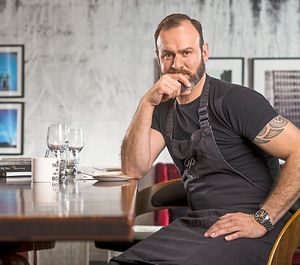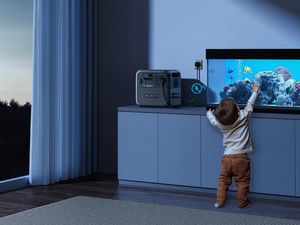Glynn Purnell: I do TV but I’m just a normal dude
He sleeps for four hours a night. Which may explain how he manages to fit so much in. There’s his Michelin-starred restaurant, of course: Purnell’s, which is celebrating its 10th anniversary. Glynn Purnell – the Yummy Brummie – remortgaged his house and maxed his credit cards in order to open it. And a decade on, that looks like the smartest move he ever made.

He has a love affair with the nation’s TV screens, frequently presenting BBC One’s Saturday Kitchen, Secret Kitchen, Great British Menu or more recently, filming 40 episodes for the new TV cooking show My Kitchen Rules. He wants to create a chocolate bar for Birmingham – well, Cadbury is now owned by Americans – and maybe open his own hotel. But though he employs 80 staff and is adored by millions of foodies, his feet remain avowedly on the ground.
When he gets time, he goes fly fishing at his local reservoir, in Birmingham, with a bunch of old dudes. “I don’t know what I’m doing, half the time. But if I catch a trout, I take it home and whack it on the barbecue.”
And, best of all, if he gets a little downtime on Sunday afternoons, he goes to his old local pub, The Centurion, near to his mum’s house, and buys a round for the entire boozer – Mario Balotelli style.
“Every now and then, because I’m from Chelmsley Wood, if I find myself with a bit of time on a Sunday afternoon and my wife’s with the kids, I have a drive around and I go and have a pint in an old pub that I used to go to; The Centurion, which is by my mum’s house.
“I rock up there and people go ‘Are you that Glynn Purnell bloke?’ And people will say ‘I remember you, you used to sit on the step’. What I do then is generally buy the pub a round and then go.
“I like that feeling of going and having a pint and sitting in the corner on my own. Some people come up and go ‘Are you Glynn Purnell?’ And I say ‘No, but I get mistaken for him all the time’. And they go ‘that’s funny because you don’t half look like him and you even sound like him’. Then they’ll stare over their shoulders at me, because they’re not sure.”
For all the red carpets and awards ceremonies, for all the TV shows and best-selling books, he’s still a man of the people. He’s a regular working class hero. “As much as I like the rock‘n’roll side of the TV and the publicity and being in the press, I like to try and embrace things that are normal. I like the pub, I like going up the market for my breakfast and I like a couple of pints down the Blues with a soggy pie.”
He knew he wanted to be a cook from the age of 10 or 11. He’d be eating pigs trotters while watching Blind Date or feasting on shrimps at his local social club when the shellfish man came round with a basket. His mum would leave him to cook for his brother and sister. She’d tell him there was plenty in the cupboard and he’d spice things up for his siblings.
Christmases weren’t about Scalextric or Tonka Toys – they were about Keith Floyd cassettes that he’d furtively listen to late at night, while all the world was asleep.
“I dreamed about having a restaurant, as a kid. I used to love watching food and drink on TV, the likes of Ken Hom, Madhur Jaffrey, Keith Floyd and Jilly Goolden, the wine woman. When I was 12 or 13, my dad bought me a cook-a-long cassette of Keith Floyd. I used to have this little wooden tape recorder that I’d listen to at night. Keith would be saying: ‘Now we chop the onions, sizzle, and now we have a little glass of wine, slurp’. I used to go to sleep listening to that.”
By the time he was 13 or 14, he was asked by his careers adviser at school what he wanted to do. He told her he wanted to open a restaurant. He wanted it to be a place where all the business people and rich people would come to eat. He was so obsessed he even wrote out a menu of what might be served – in French.
“When I was 40, two years ago, my dad dug that out of the loft and now it’s framed in my kitchen. I always say to myself the day I stop feeling the way I did when I wrote that is the day I’ll stop running restaurants. For me, it was a dream come true to open my restaurant. It was like scoring at St Andrew’s, it was like lifting the World Cup for England.”
His ambitions to win a Michelin star were borne of an experience at the Metropole, in Birmingham, where he took his first job. He remembers a guy telling him something about Michelin stars. “I said: ‘What’s one of them?’ And he said: ‘I knew you’d ask that’. Then he said: ‘Don’t worry about it, you’ll never get one.’
“And that was ingrained into my head. Throughout life you always get people that tell you what you can’t do. Nobody tells you what you can do. I say that to my young staff. It’s like, ‘you can’t do that’. If a Ferrari drives past, it’s: ‘you’ll never have one of them’. And I’ve felt that all of my life. I think most people feel like that. You know: ‘You can’t go there, you’ll never play for Birmingham City, you’ll never play for England.’ I’m a kid off a council estate and it is what it is.”
Glynn decided to take control of his life. He worked at a ferocious pace and by the age of 16 had eaten foie gras, truffles and line-caught sea bass. He knew more about ingredients than the customers who’d been eating at the Metropole for generations. “For me, I like the ceremony of food. Not to be rude, but I like the foreplay. I like the build up.”
His mates started calling him ‘Chef’ at the age of 15 – well, that or ‘Giggsy’. For the football-mad cook once bore an uncanny resemblance to former Manchester United and Wales winger Ryan Giggs. “On the football pitch, it was either Chef or Giggsy, because I used to look like Ryan Giggs, not so much now. I had a wand of a left foot as well. I used to play in the same position as him, as well.”
Gary Rhodes and Gordon Ramsay were among his earliest inspirations. He went to work with Gary at the chef’s Michelin-starred restaurant, Greenhouse, for a two-week trial. It exposed him to standards he’d never previously seen. Gordon’s restaurant was next. He booked himself into a rubbish bedsit in the back of Fulham and worked for the three-star cook at Aubergine. “It was like a light being switched on. It was some of the best food I’ve ever seen. I still speak to Gordon, I spoke to him not long after Christmas. He’s still one of my heroes. That guy was the general of that kitchen. It was precision, flair, flavours . . . you name it. The way he ran the kitchen was like a military operation. Yes, it was a little bit hostile and yes, it was a little bit focused but when a man like that is on a mission then you’re either with him or you ain’t. For me, it was two fantastic weeks and we’ve brushed paths ever since. Every time he sees me he’s got time to say hello. The guy’s a legend. When I saw him at his peak it was like watching Zidane in the centre of midfield. He just bost it.”
His route to winning his own Michelin star involved a stop-off in Ludlow, where he worked under the French chef Claude Bosi. Glynn was Claude’s sous chef when the latter won his second Michelin star. They’ve remained close friends ever since. “Claude is probably the most naturally gifted chef in the country. It’s stamped into his DNA. He’s from Lyon, which is the home of gastronomy. I’ve got so much respect for the guy. There isn’t anything the guy can’t do, when it comes to food.”
Cooking for other chefs, however, is a million miles away from owning your own restaurant – in Glynn’s case, he owns two – or cooking for millions on TV. The best chefs develop their own style and create sensational signature dishes that reflect their own personality. Glynn, he has a few. His haddock, eggs and cornflakes – the cornflakes aren’t the same as the Kellogg’s variety – is an homage to him mum’s haddock and eggs. His monkfish masala, meanwhile, won the Great British Menu on BBC Two in 2009.
Unlicensed
“It was inspired by going to the Falcon Balti House in Ward End. It was an unlicensed place on a corner. We used to catch the 55 bus with my mum, my dad, my brother and sister. If it was your birthday, you’d get taken to the Falcon, rather than McDonald’s or Wimpy. You’d have the classic chicken balti then the table naan bread, which was like a bread duvet. There’s not many places that do the table naan anymore. When you get it and it’s been slapped on the inside of that clay oven and it’s all blistering and a little bit caught on the edges, with a bit of ghee and a bit of salt on it, there’s nothing like it. The next morning, you wake up and you’ve got three or four yellow fingers and you know you’ve had a good night, y’know.”
He treats the staff at his restaurant as family. His sister-in-law, Angela, has been on the front desk for 10 years. His partner, Kerry, deals with the suppliers. Staff get the same holidays – even though that means closing the restaurant and taking a financial hit.
“It’s always been like that. That’s the way I want it to be. We break up in summer and break up at Christmas. Although I’m losing money, it’s about longevity. It’s not about making a quick buck over a short period of time, like some restaurants. I’ve got nearly 80 staff over two sites and the team at Purnell’s is like a giant family. We give the staff two weeks off over Christmas. I could open on Christmas Day but what for? For a couple of quid? Nah, it’s not worth it. If I close, the restaurant manager can go and see him mum, in Wolverhampton. When they come back in January, they’ve had a fantastic time off, they’ve had enough of Christmas and they get on with it.”
He’s a workaholic who sleeps for four hours a night. “I only have four hours sleep a day, I never have much more than that. I’m very approachable, even though I’m big and hairy. I always turn round and say to the staff: ‘If you ever get arrested, phone me first. I’ll come and get you.’ If someone’s a bit short or wants to borrow my car, it’s no problem. You have to be accessible and still be personable to all the staff. That’s really, really important. If someone’s moving house on a Sunday morning and I’m free, I’ll go and help them to move house. Just because I do Saturday Kitchen, doesn’t mean I’m not a normal dude.”
Andy Richardson





